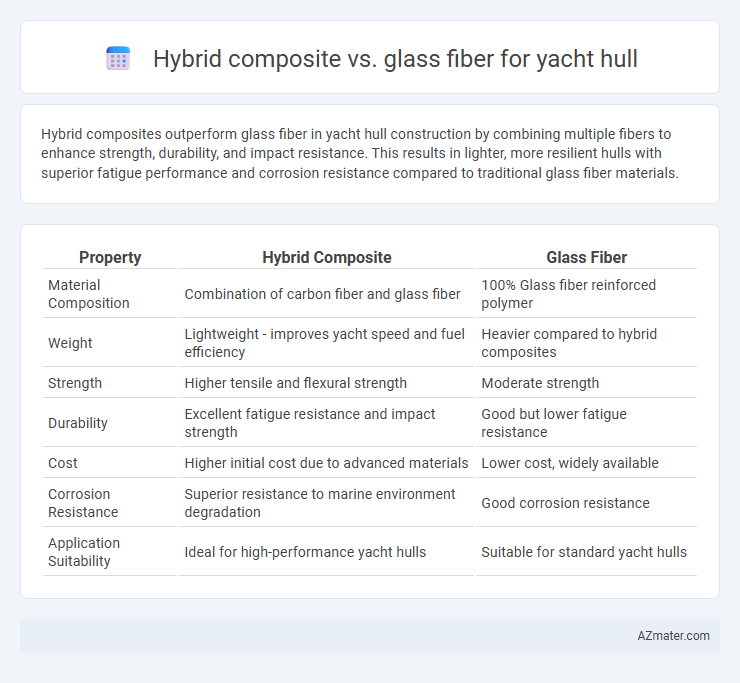Hybrid composites outperform glass fiber in yacht hull construction by combining multiple fibers to enhance strength, durability, and impact resistance. This results in lighter, more resilient hulls with superior fatigue performance and corrosion resistance compared to traditional glass fiber materials.
Table of Comparison
| Property | Hybrid Composite | Glass Fiber |
|---|---|---|
| Material Composition | Combination of carbon fiber and glass fiber | 100% Glass fiber reinforced polymer |
| Weight | Lightweight - improves yacht speed and fuel efficiency | Heavier compared to hybrid composites |
| Strength | Higher tensile and flexural strength | Moderate strength |
| Durability | Excellent fatigue resistance and impact strength | Good but lower fatigue resistance |
| Cost | Higher initial cost due to advanced materials | Lower cost, widely available |
| Corrosion Resistance | Superior resistance to marine environment degradation | Good corrosion resistance |
| Application Suitability | Ideal for high-performance yacht hulls | Suitable for standard yacht hulls |
Introduction to Yacht Hull Materials
Yacht hull materials significantly impact performance, durability, and weight, with hybrid composites and glass fiber being popular choices. Hybrid composite materials combine carbon fiber, aramid, and glass fibers to optimize strength-to-weight ratio and enhance impact resistance, making them ideal for high-performance and lightweight hulls. Glass fiber, valued for its affordability, corrosion resistance, and ease of repair, remains a standard material for yacht hulls, offering reliable structural integrity and moderate weight.
Overview of Hybrid Composites
Hybrid composites integrate glass fibers with other reinforcing materials such as carbon or aramid fibers, offering enhanced strength-to-weight ratios and improved impact resistance compared to pure glass fiber composites in yacht hull construction. This combination optimizes mechanical properties, including stiffness and fatigue resistance, while maintaining corrosion and water resistance critical for marine environments. The use of hybrid composites allows for tailored performance characteristics, providing yacht builders with versatile options to achieve lightweight, durable, and high-performance hulls.
Understanding Glass Fiber Composites
Glass fiber composites, made from woven glass fibers embedded in a resin matrix, offer high strength-to-weight ratios and excellent corrosion resistance, making them a prevalent choice for yacht hull construction. Their durability against marine conditions and cost-effectiveness contribute to sustained structural integrity and lower maintenance over time. While hybrid composites integrate multiple fiber types for tailored performance, glass fiber remains favored for its balance of flexibility, impact resistance, and ease of repair in yacht hull applications.
Strength and Durability Comparison
Hybrid composites, combining carbon fiber and glass fiber, offer superior strength-to-weight ratios compared to pure glass fiber, enhancing yacht hull performance under dynamic loads. Glass fiber excels in durability with excellent resistance to impact, corrosion, and fatigue, making it a cost-effective choice for long-term marine exposure. The hybrid composite's increased tensile strength and stiffness improve hull rigidity, while glass fiber's proven resilience ensures structural integrity against harsh ocean conditions.
Weight and Performance Considerations
Hybrid composite yacht hulls combine materials like carbon fiber and glass fiber, significantly reducing weight compared to pure glass fiber constructions, resulting in enhanced speed and fuel efficiency. The higher stiffness-to-weight ratio of hybrid composites improves overall hull performance, offering superior strength and durability under dynamic marine conditions. Glass fiber remains cost-effective and provides adequate strength, but hybrid composites deliver optimized weight savings and performance benefits critical for high-performance yachts.
Resistance to Corrosion and Water Ingress
Hybrid composite yacht hulls exhibit superior resistance to corrosion and water ingress due to the combination of fiber types and resin systems, which enhance barrier properties and reduce permeability. In contrast, glass fiber alone is more prone to water absorption and osmotic blistering, leading to potential structural weakening over time. Optimizing resin formulations in hybrid composites further improves durability and minimizes maintenance needs in marine environments.
Cost Analysis: Hybrid vs Glass Fiber
Hybrid composites for yacht hulls offer a cost-effective alternative to traditional glass fiber by combining materials like carbon and glass fibers, which can reduce overall material costs while enhancing performance. Glass fiber remains less expensive upfront but may result in higher long-term maintenance costs due to lower strength-to-weight ratios and durability compared to hybrids. Evaluating total lifecycle cost, hybrid composites often provide better value through reduced repair frequency and improved fuel efficiency from weight savings.
Maintenance and Longevity
Hybrid composites for yacht hulls offer enhanced maintenance benefits and superior longevity compared to traditional glass fiber, due to their improved resistance to fatigue, impact, and environmental degradation. These materials exhibit reduced susceptibility to water absorption and UV damage, minimizing the frequency and cost of repairs over the vessel's lifespan. Glass fiber remains popular for cost-effectiveness but typically demands more frequent maintenance and has shorter durability under harsh marine conditions.
Environmental Impact and Sustainability
Hybrid composites for yacht hulls reduce environmental impact by combining natural fibers with synthetic ones, lowering reliance on non-renewable glass fibers and decreasing carbon emissions during production. Glass fiber composites, while durable and cost-effective, pose significant sustainability challenges due to energy-intensive manufacturing and limited recyclability. Hybrid composites facilitate better end-of-life disposal and promote circular economy principles, making them a more sustainable choice for eco-conscious marine applications.
Choosing the Right Material for Your Yacht Hull
Choosing the right material for your yacht hull depends on balancing strength, weight, and durability; hybrid composites offer superior mechanical properties and corrosion resistance compared to traditional glass fiber, making them ideal for high-performance vessels. Hybrid composites combine fibers such as carbon or aramid with glass fiber, enhancing stiffness and impact resistance while reducing overall weight, which improves fuel efficiency and handling. Glass fiber remains cost-effective and provides good durability for recreational yachts, but hybrid composites excel in longevity and performance under demanding marine conditions.

Infographic: Hybrid composite vs Glass fiber for Yacht hull
 azmater.com
azmater.com